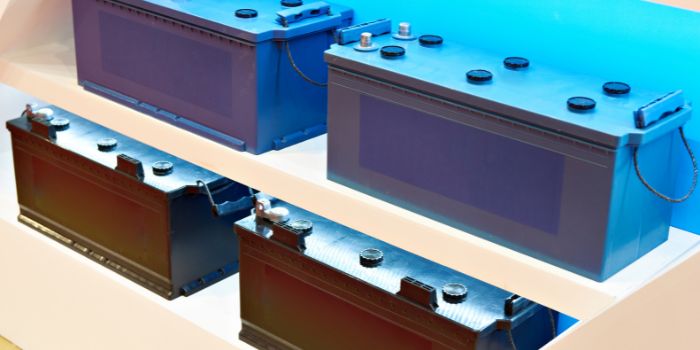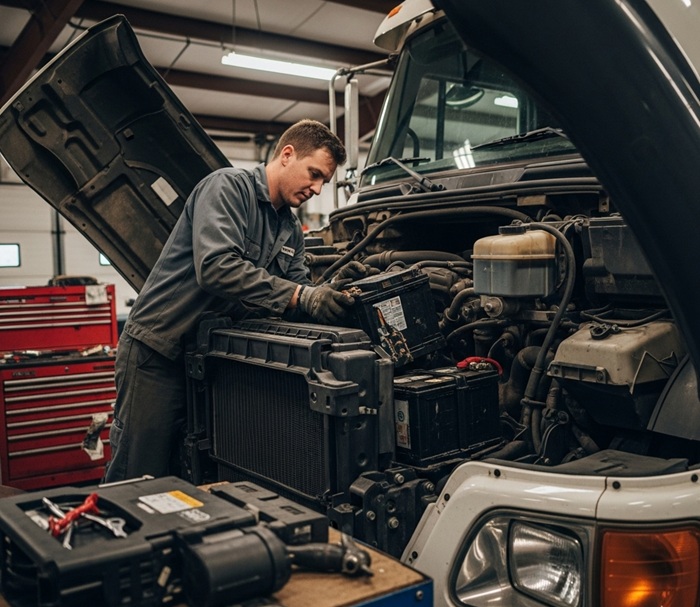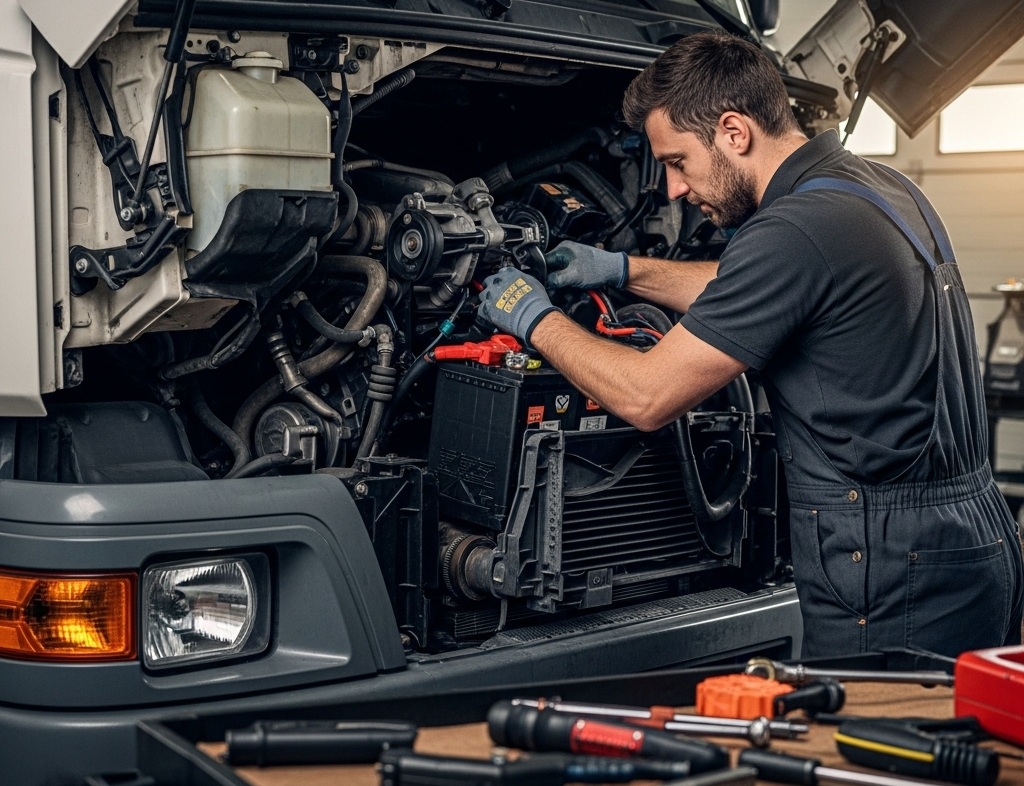
Ever caught yourself wondering if a marine battery could double as your truck’s powerhouse? You’re not alone.
Marine batteries are engineered for boats and watercraft, built to withstand harsh conditions, repeated charging cycles, and even salty seas.
But how well do they perform under your truck’s hood?
The short answer: absolutely—they can. Using a marine battery in your truck isn’t just possible—it can even be a smart move in the right scenario.
However, like any upgrade, it comes with trade-offs. If you crave extra reserve power, face rugged conditions, or simply like to be prepared for anything, a marine battery could be a surprisingly savvy choice. Just be sure to check compatibility before making the switch.
When to Use a Marine Battery in a Truck?
While a marine battery isn’t the typical choice for most trucks, it can be very useful in certain situations.
For trucks with auxiliary accessories like winches, powerful sound systems, camping gear, or extra lights, a marine battery’s deep-cycle capabilities allow it to handle repeated power draws while still providing reliable starting power.
Marine batteries also shine in off-road or heavy-vibration conditions. Their rugged construction makes them resistant to shaking and impacts, making them a solid option for construction trucks, overland rigs, or any vehicle tackling rough terrain.
They’re also ideal as a secondary or backup battery in dual-battery setups, where the main battery handles engine starts and the marine battery powers accessories—common in RVs and work trucks.
In a pinch, a marine battery can even serve as a temporary replacement if your truck battery fails unexpectedly.
That said, for everyday driving or in extremely cold conditions, a standard truck battery is still the best choice for reliability and performance.
Why a Marine Battery can be a Good Fit for Your Truck?
Designed to handle the harshest environments, marine batteries can be a smart, versatile upgrade for your truck.
Here are a few pros of using it…
1. Built for Durability: Marine batteries are tough. Designed to withstand vibrations, temperature swings, and rough conditions, they often last longer than standard truck batteries, especially if your vehicle sees off-road or heavy-duty use.
2. Reliable Deep-Cycle Power: Unlike typical car batteries, marine batteries can be repeatedly discharged and recharged.
That means if you’re running accessories like fridges, winches, or extra lighting during camping or work trips, a marine battery won’t let you down.
3. Salt-Ready: Winter roads can be brutal. With corrosion-resistant designs and thicker plates, marine batteries handle salty environments better than most automotive batteries.
4. Extra Reserve Capacity: Marine batteries can store more energy, giving your truck’s electrical systems longer-lasting support when needed.
5. Budget-Friendly: In some cases, marine batteries cost less than their automotive counterparts, making them a practical choice if you’re balancing performance and affordability.
Potential Drawbacks of Using a Marine Battery in Trucks or Cars
While marine batteries offer unique benefits, they also come with trade-offs you should consider before swapping them into your truck or car.
Here are a few of them you should keep in mind…
1. Size & Weight: Marine batteries are often bigger and heavier. This can affect installation, handling, and even fuel efficiency.
2. Cold Cranking Power: While excellent at providing steady energy, marine batteries sometimes fall short on cold cranking amps (CCA). That means chilly mornings could make starting your engine a bit tougher.
3. Fit & Compatibility: Not all marine batteries fit neatly in a truck. Check terminal types, voltage, and connections to avoid headaches or performance issues.
4. Warranty Differences: Marine batteries may come with shorter warranties than automotive batteries. If long-term coverage matters to you, factor this in.

Compatibility and Performance Checks When Using Marine Battery in Truck
Marine batteries can be a versatile power solution for trucks, but getting the most out of them means understanding compatibility, performance differences, and best-use practices.
Let’s get into more of these details here…
Voltage and Type: Most marine batteries are 12-volt, just like standard truck batteries.
Still, it’s essential to double-check that the marine battery’s voltage, capacity, and other specifications align with your truck’s requirements.
Mismatched specs can impact performance or even cause damage.
Deep-Cycle vs. Starting Power: Marine batteries excel at deep-cycle performance, providing steady power over long periods—perfect for running fridges, winches, lights, and other accessories.
Truck batteries, on the other hand, are built for high cranking power to start heavy-duty engines.
While a marine battery can start your truck, it may not match the efficiency or lifespan of a dedicated truck battery under repeated heavy starts.
Use as a Secondary Battery: One smart approach is a dual-battery setup. Let a truck battery handle the engine starts while a marine battery powers your accessories.
This setup maximizes performance and protects both batteries from excessive wear.
Consult Professionals: When in doubt, always seek advice from a professional or follow your truck manufacturer’s guidance.
Ensuring compatibility upfront avoids surprises and keeps your vehicle’s electrical system safe and reliable.

Can a Dead Marine Battery be Recharged? How to Recharge it for Your Truck?
Yes, a dead marine battery can be recharged, and the process is quite similar to charging a regular car battery.
- Start by connecting the positive and negative terminals of the battery to a compatible charger, making sure the connections are secure.
- Then plug the charger into a power outlet and switch it on.
- Depending on the battery’s condition and size, charging may take several hours, so patience is key.
While charging, it’s also a good idea to check the electrolyte levels. Marine batteries often require distilled water every 30–60 days to maintain proper function, though this can vary by brand and battery type.
Maintaining the correct water level helps prolong the battery’s life and ensures optimal performance.
How do you know if your marine battery has gone bad?
There are a few clear warning signs: the battery may no longer hold a charge, it could leak electrolyte, or it may appear swollen or deformed.
If you notice any of these issues, it’s time to replace the battery rather than risk damage to your vehicle or electrical system.
When it comes time to dispose of a marine battery, recycling is the safest option. Most recycling centers accept marine batteries and will properly recycle the lead, plastic, and acid components, keeping harmful materials out of the environment.
Marine batteries typically last 3–5 years, depending on usage, maintenance, and brand.
Be mindful that extreme cold can affect performance; most marine batteries start to freeze around 32°F (0°C), though this can vary slightly. Proper storage and regular maintenance will help you get the most life and reliability out of your battery.

Alternatives to Marine Batteries: Reliable Options for Starting Power and Heavy-Duty Use
If a marine battery isn’t the right fit for your truck, there are plenty of truck-specific alternatives that deliver better performance and reliability.
AGM (Absorbent Glass Mat) batteries are a top choice for drivers who need consistent starting power in all conditions.
They’re maintenance-free, spill-proof, and resistant to vibrations—perfect for off-road adventures or heavy-duty trucks.
Some great options include DieHard Platinum AGM, Exide Edge AGM, or Bosch S5 AGM batteries, all known for strong cranking power and long lifespan.
For trucks that run multiple accessories—like winches, fridges, or lighting—automotive deep-cycle batteries are a better alternative than marine batteries.
They provide steady, long-term power without sacrificing engine starts. Options like the Lifeline GPL-4CT, VMAX MR137, or Renogy Deep Cycle AGM are designed for high-demand setups, offering reliability for extended electrical use.
If you want a battery that combines cranking power with deep-cycle capability, consider dual-purpose truck batteries.
These are ideal for trucks with auxiliary lights, inverters, or heavy-duty accessories.
Brands like ACDelco Professional AGM, Optima YellowTop, or Interstate MTX-31 deliver a great balance of engine-starting strength and deep-cycle performance, making them a practical alternative to marine batteries for serious truck users.
Conclusion
A marine battery can work in your truck or car, but the best choice depends on your needs. If you want durable, long-lasting power, go for a marine battery.
If budget and compact size matter more, a standard car battery is the better option. Always check fit, weight, and warranty before making your decision.
